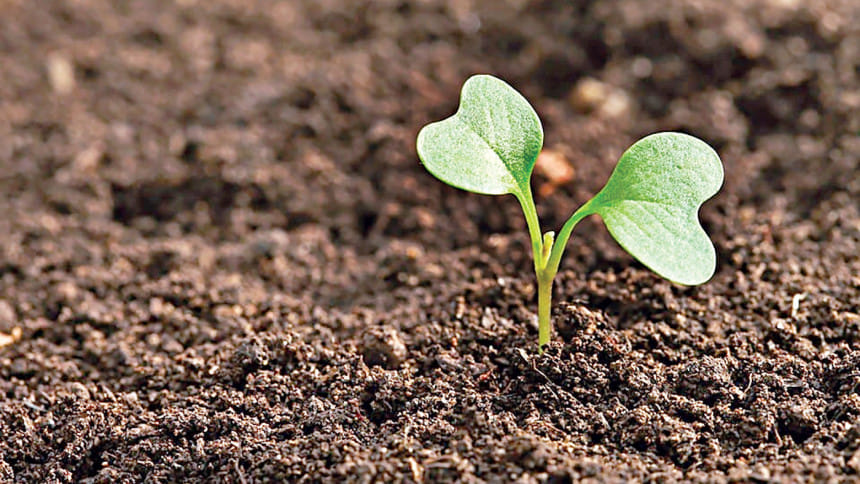The overlooked plight of our soil

Around 11.07 million hectares of land, which accounts for 75 percent of the country's geographical area, suffered soil nutrient depletion, found a recent study.
A study conducted by three scientists of the state-run Soil Resource Development Institute (SRDI) revealed the staggering picture of land degradation.
Out of 11.07 million hectares, 1.47 million hectares of land suffered severe soil nutrient depletion, implying that the land has lost 50 to 75 percent of its productivity. It will be very difficult to use the land for further cultivation.
The study was conducted by Ameer Md Zahid, Md Altaf Hossain and Neelima Akter Kohinoor, three principal scientific officers of SRDI.
Land degradation is defined as a change in one or more land or soil properties that result in a decline in its quality. Land degradation reduces agricultural productivity and damages the ecosystem, posing a direct threat to food security and the natural environment.
According to the study, soil organic matters -- that provide soil nutrient, bind soil particles and improves the water-holding capacity of the soil -- has depleted 78.7 percent of the country's landmass.
From the severity and extent of land degradation within such a short duration, we can understand that manmade factors are accelerating this degradation at an abnormally high speed. Unplanned urbanisation and industrialisation, discharging industrial effluents into water bodies, unregulated mining and excessive application of chemical pesticides and fertilisers are some of these manmade factors.
Acidification has affected 54.8 percent of land and 30 percent of the country's soil lost productivity due to arsenic contamination.
Around 11.5 percent of the land degraded due to hill erosion, 10 percent due to drought, 5.1 percent due to riverbank erosion, 4.3 percent due to soil sealing and 2.9 percent of degradation occurs due to sandy overwash.
Overall, the study reveals that from 2000 to 2020, 11.24 million hectares of land suffered moderate to very severe levels of degradation.
This implies that 76 percent of Bangladesh's land lost 10 to 75 percent of its productivity in the last 20 years.
The study further mentions that 27,000 hectares of land have been degraded (moderate to very severe degradation) every year since 2000.
One of the researchers, Ameer Md Zahid told The Daily Star, "From the severity and extent of land degradation within such a short duration, we can understand that manmade factors are accelerating this degradation at an abnormally high speed."
He stated that unplanned urbanisation and industrialisation, discharging industrial effluents into water bodies, unregulated mining and excessive application of chemical pesticides and fertilisers are some of these manmade factors.
Prof Mohammad Mofizur Rahman Jahangir of Bangladesh Agricultural University's soil science department, said, "In the 1960s, there was a scarcity of only one nutrient in our soil -- nitrogen. We handled the situation by applying urea. After 2010, it was found that almost all the nutrients in our soil have been decreasing at an alarming rate due to land degradation. This poses a serious threat to our food security."
The researchers recommended a comprehensive national land use policy to tackle this impending crisis.
"Comprehensive land use policy has to be formulated in a coordinated way. Active participation and commitment from all the relevant offices and stakeholders must be ensured," said Ameer Md Zahid.
"Besides, we should encourage sustainable land management practices, such as rainwater harvesting, sand-dune reclamation, management of soil organic matter, and urban forestry to reduce further land degradation," he added.

 For all latest news, follow The Daily Star's Google News channel.
For all latest news, follow The Daily Star's Google News channel. 




Comments